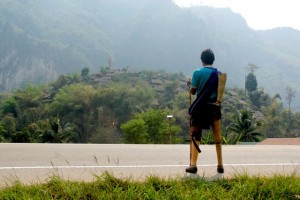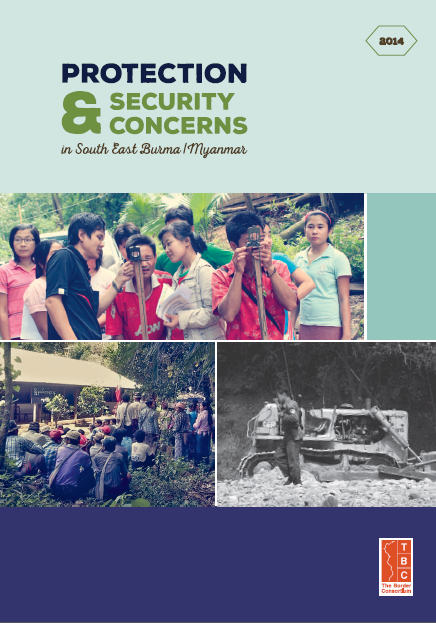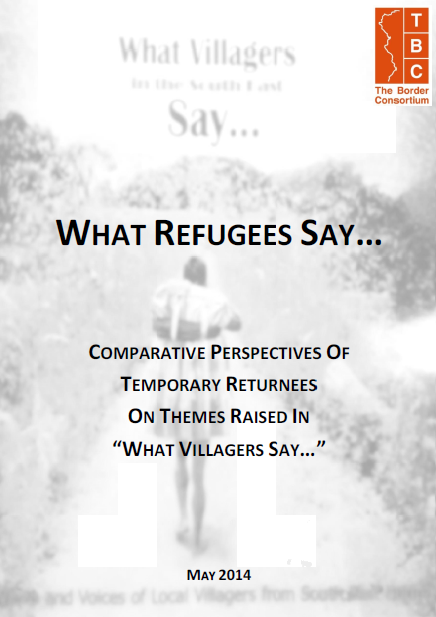Posts Tagged ‘Landmines’ (13 found)
Protection and Security Concerns in South East Burma/ Myanmar
The peace process in Burma/Myanmar1 is at a critical juncture from which it could evolve into a transformative national dialogue or splinter into a divisive charade. While hopes for substantive and inclusive discussion about structural injustice remain, ongoing militarisation and attacks by the national armed forces2 are undermining the confidence of ethnic stakeholders. This report seeks to highlight the protection and security concerns of conflict-affected communities. […]
• • •What Refugees Say…
Between March‐April this year, focus group discussions were held with temporary returnees to SE Burma/ Myanmar from all 9 refugee camps along the Thailand‐Burma/ Myanmar border. The aim was to gain a snapshot of individual perspectives and concerns on current conditions on the ground, rather than conducting a formal survey representational of the whole refugee caseload.
The consultations focused on the conditions in the areas they returned to, the changes they and residents in those areas had detected since recent political and military shifts in the country, and their perceived current barriers to return.
The participants were identified by Section Leaders, with criteria that they must have returned to SE Burma/ Myanmar since the ceasefires were brokered, be adults, and that there should be some gender equity amongst them. In total, 85 temporary returnees participated in the consultations, with 35% being female. Over 100 others, comprising senior community leaders and CBO staff were also engaged through the process, although the main findings in this report only reflect the perspectives of those who had recently returned to their country of origin […]
• • •Invisible Enemies : Responding to the Landmine Threat in Burma/Myanmar
“Invisible Enemies” aims to inform different stakeholders — including the government, armed non-State actors, civil society, communities and villagers — about the short and long-term impact of landmines. At the same time, as everybody plays an important role in tackling the landmine problem, it also encourages all these stakeholders ‘to be part of the solution’ […]
• • •Invisible Enemies: A Video to Respond to the Landmine Threat in Burma/Myanmar
Geneva Call is pleased to release the video on landmines in Burma/Myanmar entitled ‘Invisible Enemies: responding to the landmine threat’.
Invisible Enemies aims to inform different stakeholders – including the government, armed non-State actors, civil society, communities and villagers – about the short and long-term impact of landmines […]
• • •The Burmese Government Must Immediately End Human Rights Violations, Including Violence Against Women, in Palaung Areas
During the past four months, the Burmese Army has been carrying out fierce military offensives in Palaung areas against the Shan State Army-North (SSA-N), Kachin Independence Army (KIA) and Ta’ang National Liberation Army (TNLA). The Palaung Women’s Organization and Ta’ang Students and Youth Organization (TSYO) are gravely concerned at the impacts of the fighting on local communities, who have suffered widespread abuses by the Burmese military […]
• • •Update of Human Right Violations by the Burma Army During Offensives in Palaung Areas (March and April 2013)
Since January 2013, Burmese government troops have been carrying out military offensives in Palaung areas against the Shan State Army-North (SSA-N), Kachin Independence Army (KIA) and Ta’ang National Liberation Army (TNLA). The Burmese troops have committed widespread human rights violations during these operations […]
• • •More Armed Conflict, More Landmines
 Last Thursday, 4 April, was International Day of Mine Awareness. While over 80% of the world’s countries have signed or agreed to the 1997 Ottawa Convention banning the use of landmines, Burma is among the 20% who have not. Recent statistics place Burma as the country with the third largest amount of land mine causalities in the world. From 1999 to 2011, over 3,000 men, women and children have lost their lives to mines in Burma. A week and a half ago, two porters, forcibly conscripted by the Burma Army, were killed in Northern Shan State by landmines.
Last Thursday, 4 April, was International Day of Mine Awareness. While over 80% of the world’s countries have signed or agreed to the 1997 Ottawa Convention banning the use of landmines, Burma is among the 20% who have not. Recent statistics place Burma as the country with the third largest amount of land mine causalities in the world. From 1999 to 2011, over 3,000 men, women and children have lost their lives to mines in Burma. A week and a half ago, two porters, forcibly conscripted by the Burma Army, were killed in Northern Shan State by landmines.
Mines are regularly used by both government forces and non-state armed groups. Parts of Northern and Eastern Burma have some of the highest concentration of mines in the world. The Land Mine and Cluster Munitions Monitor identifies over 47 townships in Kachin, Karen, Karenni, Mon, Arakan and Shan States that suffer from mine contamination as well as in Pegu and Tenasserim Regions […]
Urgent Update on Human Rights Situation in Northern Shan State
Over 1,000 flee Burma Army abuses in new operations against Shan State Army-North
Atrocities by Burmese troops in a new military operation against the Shan State Army North (SSA-N) have caused over 1,000 villagers, from 16 villages in Tangyan, to flee from their homes during the past two weeks […]
• • •Statement No. (2/2013) of the Myanmar National Human Rights Commission Regarding the Conflict in Kachin State
The Myanmar National Human rights Commission is gratified that the Union Peace-Making Committee and the KIO delegation were able to issue a joint statement at the peace talks held at Shweli (Ruili) of the People’s Republic of China on 11-12 March 2013 and that positive developments were achieved. The Myanmar National Human Rights Commission also whole-heartedly welcomes the statement that the Union Government will accelerate development and rehabilitation tasks in the Kachin State as the process to achieve cease-fire has commenced under said joint statement […]
• • •Launch of “Uncertain Ground: Landmine Use in Eastern Burma”
Karen Human Rights Group (KHRG) today released a major new report documenting the continued challenges posed by widespread use of landmines in eastern Burma and called for urgent humanitarian mine action that addresses the priorities and concerns […]
• • •










 All posts
All posts